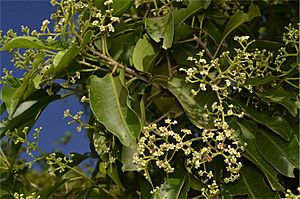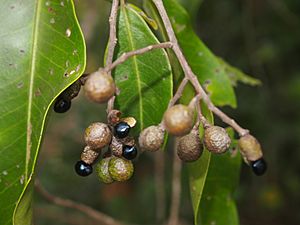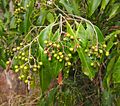Glasswood facts for kids
Quick facts for kids Glasswood |
|
|---|---|
 |
|
| Scientific classification | |
| Genus: |
Geijera
|
| Species: |
salicifolia
|
| Synonyms | |
The Glasswood (scientific name: Geijera salicifolia) is a cool shrub or tree. People also call it green satinheart or scrub wilga. It belongs to the Rutaceae family, which includes citrus fruits.
This plant is found naturally in Australia, New Guinea, and New Caledonia. It has long, narrow leaves, small white flowers, and round fruits. Each fruit holds a shiny black seed.
Contents
What Does Glasswood Look Like?
Glasswood can grow as a shrub or a tree. It usually reaches a height of 25 to 35 metres (about 80 to 115 feet). Sometimes, its branches, flowers, and the underside of its leaves can be a bit hairy.
Its leaves are shaped like a narrow oval or an egg. They are usually 60 to 130 millimetres (2.4 to 5.1 inches) long. The leaves are also 10 to 50 millimetres (0.4 to 2 inches) wide. They grow on a small stalk called a petiole, which is 3 to 22 millimetres long.
Flowers and Fruit
The flowers of the Glasswood tree are small and white. They grow in loose groups that can be 20 to 180 millimetres (0.8 to 7.1 inches) long. Each flower has tiny sepals, which are like small leaves at the base of the flower, about 0.5 to 1.2 millimetres long. The petals are 2 to 3 millimetres long.
Glasswood usually flowers from September to November. After flowering, it produces oval or round fruits. These fruits are about 5 to 6 millimetres (0.20 to 0.24 inches) long. Inside each fruit, you'll find a single, shiny black seed.
Where Does Glasswood Grow?
Glasswood trees like to grow in rainforests, including dry rainforests, and woodlands. You can find them from sea level up to an altitude of 880 metres (about 2,900 feet).
This plant is found in New Guinea, New Caledonia, and Australia. In Australia, it grows from Coen in Queensland. It spreads south to the Budderoo National Park in New South Wales. You can also find it west in the north-east part of the Northern Territory.
Is Glasswood Safe?
Good news! This type of wilga tree is not in danger. The Queensland Government lists it as being of "least concern" under their Nature Conservation Act 1992. The Territory Parks and Wildlife Conservation Act 1976 also considers it safe. This means there are plenty of Glasswood trees around.
Images for kids





